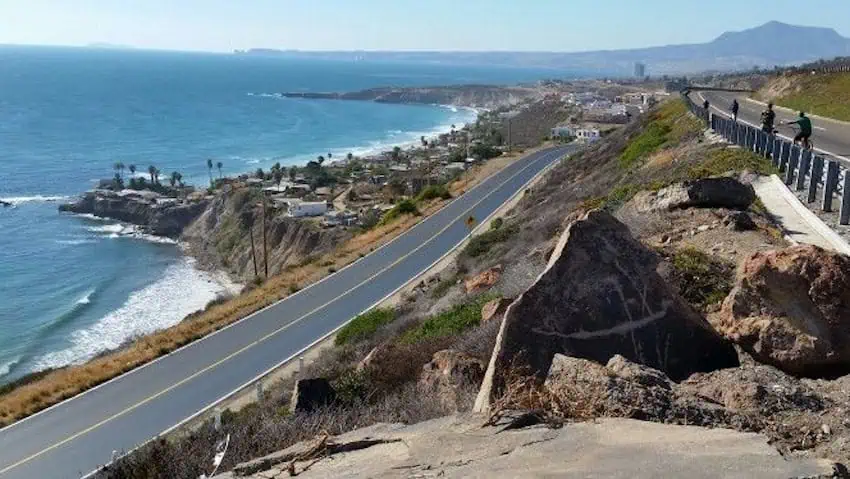What’s the news in Baja California this week? The state dwarfs Baja California Sur in tourism, despite always popular Los Cabos in the latter. Border proximity is a notable factor, as is the presence of numerous attractive destinations, including Tijuana, Ensenada, and the wine country of Valle de Guadalupe. Tijuana alone received more than eight million visitors in 2023 (more than double the total of Los Cabos), and Baja California welcomed about 30 million statewide.
Here are the stories you might have missed:
Rosarito to host Tianguis Turístico Mexico in 2025

As a reflection of its tourism bona fides and its border proximity, Baja California has been chosen to host the 49th edition of Tianguis Turístico Mexico (TTM), Latin America’s largest tourism-related fair.
The event dates back to 1975, with the first 36 iterations of the TTM held in Acapulco. That city still hosts biennially (most recently in 2022 and 2024), but since 2012, other destinations have also been chosen to host as the TTM has grown in size and scope.
For example, in 2023, Mexico City welcomed 1,328 exhibiting companies (including hotel and airline representatives and tourism offices from all 32 Mexican states) and over 2,000 buyers from 90 countries worldwide.
This year, Tijuana takes over hosting duties from April 28 to May 1. Billed as the first binational edition, some activities will happen in the U.S. (in San Diego), and 45% of buyers attending will be from the U.S. and Canada. Buyers in this context means travel agents, tour operators, and the like.
“I firmly believe that tourism is the only bridge that unites everything,” Josefina Rodríguez Zamora, head of Mexico’s Secretaría de Turismo (Sectur), told La Jornada. She’s bullish that despite the constant news of tariffs and deportations (over 40,000 people were deported to BC in 2024), the number of visitors to Mexico from the U.S. will increase, as it does nearly every year. Upwards of 14 million and a half million are expected in 2025.
That would indeed be an uptick. In 2024, Mexico received 45 million foreign visitors, 12.7 million of whom were from the U.S. The total figure made Mexico the seventh most popular nationwide tourist destination in the world last year, trailing only France, Spain, the U.S., China, Italy, and Turkey.
Baja California recognizes animals as sentient life forms with legal rights

Many long-held assumptions about animals are being overturned. Recent studies, for example, have shown that the songs of humpback whales are structured similarly to human language. Despite this breakthrough, many researchers remain hesitant to term how whales communicate as language. However, this reticence seems less like scientific rigor than an ingrained arrogance that assumes only humans have the capacity for certain varieties of intelligence and feeling.
This is not by everyone, naturally. Many people are convinced that animals deserve and should be guaranteed respectful treatment. In some cases, this idea is taking on the force of law. Baja California, for instance, just became the latest governmental body to enact legislation recognizing animals as sentient beings with inherent rights.
On April 2, 2025, the 25th Legislature of the Baja California Congress passed a reform formally enshrining this recognition in the state constitution. This initiative, approved by Governar Marina del Pilar Ávila Olmeda, provides the state with a legal framework to make policy changes or enact regulatory protections for the well-being of animals, who are now legally “sentient,” a word defined as “able to perceive or feel things.”
By doing so, Baja California joins a growing list of nations and states. Over 30 countries have now enacted animal welfare or sentience-related legislation. Many of these, it must be noted, are in Europe. France’s designation of animals as sentient beings dates back to 1976. Belgium has canonized this belief in its constitution. In 2022, the U.K. established an Animal Sentience Committee with input into animal-related policies.
CDMX and two other Mexican states, Michoacán and Nuevo León, have also recognized that animals are sentient, joining the movement to drive social awareness of the issue. However, what those recognitions mean for laws and enforcement policies is sometimes murky. BC’s governor, by contrast, notes per UnoTV that it will become “the first state animal protection system in Mexico.”
What does this mean? Three new announced offices will be added to the state bureaucracy: an animal welfare directorate, an environmental prosecutor’s office, and a state-run animal health facility. BC is thus backing up the legal protections for animals amended in the state constitution with a practical framework to enforce them.
The 39-year-old is the first female governor of Baja California and, according to a December approval rating survey, the most popular governor in Mexico.
Major bypass from Tijuana to Ensenada planned

Studies are underway for a major new road project slated to begin construction in 2026: a 24-kilometer, two-lane bypass that will streamline traffic between Tijuana and Ensenada, with connections to Rosarito, Tecate, and Valle de Guadalupe. The project is expected to take four years to complete, at a cost of 3.5 billion pesos, per La Secretaría de Infraestructura, Comunicaciones y Transportes (SICT).
It’s one spoke on a much larger wheel, Claudia Sheinbaum’s 250 billion investment in federal highways as part of the National Road Infrastructure Program scheduled during her six-year term as president. At least nine federal highways and nine bridges will be affected. Thirty-five billion is earmarked for the program in 2025.
Not only is the Tijuana to Ensenada bypass meant to provide enhanced accessibility to area destinations, but it will also offer an estimated ten thousand plus jobs to regional residents.
Solar panels approved for Mexicali

President Sheinbaum has also greenlit 5,500 photovoltaic solar panels, which will be installed in Mexicali as part of the Sol del Norte program and should help to lower electricity bills locally.
Chris Sands is the Cabo San Lucas local expert for the USA Today travel website 10 Best, writer of Fodor’s Los Cabos travel guidebook and a contributor to numerous websites and publications, including Tasting Table, Marriott Bonvoy Traveler, Forbes Travel Guide, Porthole Cruise, Cabo Living and Mexico News Daily. His specialty is travel-related content and lifestyle features focused on food, wine and golf.
